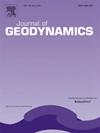Effects of multi-seamount subduction on accretionary wedge deformation: Insights from analogue modelling
Abstract
Deformation patterns caused by the subduction of a single seamount or aseismic ridge have been well studied in analogue and numerical models. However, the effects of sequential multi-seamount subduction on accretionary wedge deformation have rarely been investigated in details. We performed a series of analogue modelling experiments of sequential subduction involving two seamounts of variable shape, spacing and rheological properties of strata to better understand the deformation mechanisms of an accretionary wedge with multi-seamount subduction. The results demonstrate that a seamount significantly hinders the seaward propagation of the accretionary wedge and facilitates lateral propagation. Two structural quiet zones form at the leading and trailing edges of the subducted seamount in the early stage of collision. As the seamount deeply penetrates into the wedge, the structural quiet zone in the leading edge is remoulded by a duplex structure, which may help the upward transport of deep subducted sediments back into the shallow area. Comparatively, the structural quiet zone in the trailing edge remains undeformed because it is situated in the stress shadow of the seamount. Deformation of the strata between two subducting seamounts may occur by thrusts laterally propagating into the seamount gap, which is facilitated by the décollement layer. The modelling results provide insights into the complex deformation mechanisms related to seamounts collision observed in the accretionary wedge offshore from the Costa Rica margin.

 求助内容:
求助内容: 应助结果提醒方式:
应助结果提醒方式:


